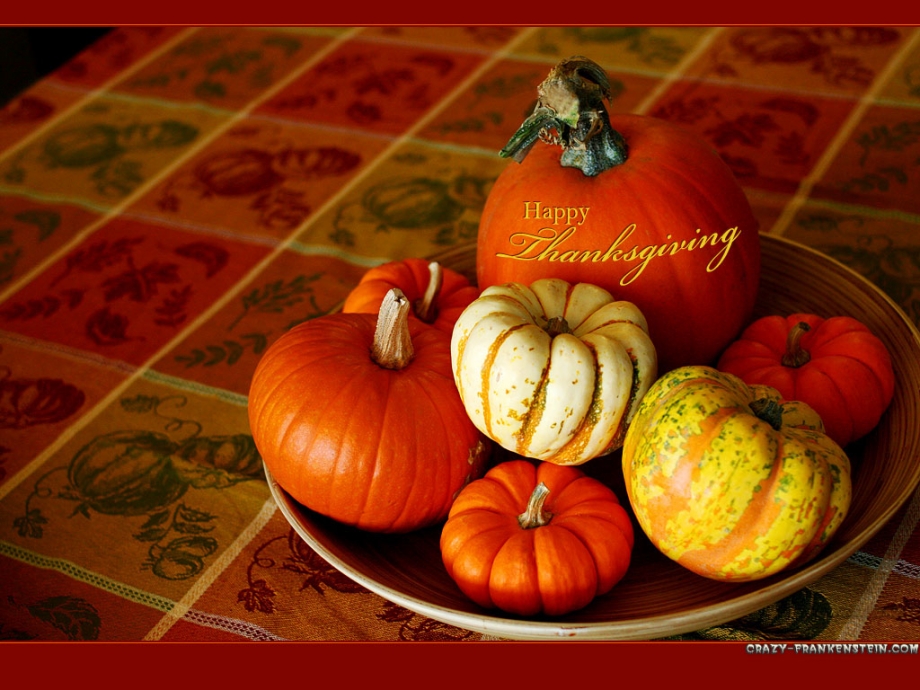| << Previous 1 - 2 - 3 - 4 - 5 - 6 - 7 Next >> |

“Rejoice in the Lord always and again I will say: REJOICE.” (Philippians 4:4)
This Thanksgiving Season I am absolutely thrilled and thankful for all of you at TSH. When our Father spoke to me in June-06, right after my graduation from the King’s Seminary that he was giving me hidden treasures, little did I know that those treasures would come in earthen vessels such as you. When the Lord gives a gift, He always wraps it in a person – you are God’s gifts to Victoria, Caleb and me. We are so very grateful for all of you.
In this season, I would like to pastorally exhort you with the words the Apostle Paul spoke to us (Phil 4:4): “Rejoice in the Lord always and again I will say: REJOICE.” The Apostle Paul used the word ‘rejoice’ in the imperative voice. It is a commandment from the Lord. The Lord commands you and me to rejoice because we are the tabernacle of the Holy Trinity – “Christ-indwelt” beings. In the divine flow, divine dance and divine communion between the Father, Son and the Spirit… you and I are active participants because of the Son. The Holy Spirit – the Spirit of Joy is in you. A Christian life is impossible to be lived – only Christ can live it in and through you.
SO, in this Thanksgiving-Hanukkah-Christmas Season, allow Him – the Christ – to rejoice through you – let the Lion of the Tribe of Judah ROAR!
Now you may be asking: “How do I allow Him to roar?”
Well…here’s how you do it…This season make a commitment to love and honor your immediate and extended families. …No matter how they have behaved or how you have behaved, you are related because God chose you to be RELATED to them!
Remember the ALL encompassing commandment the Lord gave His children in the New Testament (John 13:34-35): “A new commandment I give to you, that you love one another: just as I have loved you, you also are to love one another. By this all people will know that you are my disciples, if you have love for one another.” All other commandments in the Bible (Old and New Testaments) is anchored to this one GREAT New Testament commandment in John 13:34-35. In John 13 the Lord Jesus Christ shows us the proper mind set in approaching the Celebration Table with our family and friends with whom we may have some difficulties… Reflecting on this way of Christ, the Apostle Paul tells us in 1 Cor.11:23-26 that “…the Lord Jesus on the night when he was betrayed took bread, and when he had given thanks, he broke it, and said, “This is my body which is for you. Do this in remembrance of me.” In the same way also he took the cup, after supper, saying, “This cup is the new covenant in my blood. Do this, as often as you drink it, in remembrance of me.”
Notice the beginning of verse 23… the Lord Jesus on the night when he was BETRAYED. This was his most agonizing night for our Lord Jesus because his very best friends and family would eventually betray, abandon, and deny Him. At the celebration table He absolutely knew that this would happen. Yet in the middle of that crazy muddle, he gathered together with those very friends who would eventually betray Him, and He found time to have a THANKSGIVING! Christ has showed us the pathway forward for any healing and reconciliation for our lives.
This season is a time to share and be thankful for one another. It is a time to set aside our religious, political, interpersonal and cultural differences. It is a time to be thankful for one another and our lives. The pathway toward health and wholeness always begins with being thankful. Just read the Psalms to see this reality. Christ knew that the Father was in charge of His life, and so He rejoiced in the Spirit. So, you and I need to remember that the same Father is in charge of our lives. His Spirit lives in you and me, and He wants to REJOICE through us.
Allow Him to rejoice through you – let the Lion of the Tribe of Judah ROAR, and let every obstacle fall! DO NOT let the Grinch steal your Thanksgiving-Hanukkah-Christmas Season.
There are many benefits in rejoicing, laughing and celebrating…The following excerpt is from an article from www.truthorfiction.com:
“Thankfulness is a powerful antidote for many of the emotional and physical problems we see in our society. Thankfulness is a mindset we can choose, and one that we experience emotionally throughout our entire body. One’s state of mind and his physical condition are inextricably linked, and how you feel emotionally affects how you feel physically.
The medical community has scientifically documented the mind-body connection in regard to many diseases. Research indicates that “fear has been shown to trigger more than fourteen hundred known physical and chemical stress reactions, and activates more than thirty different hormones and neurotransmitters.” Uninterrupted long-term stress has been linked to problems in the heart and vascular systems such as hypertension (high blood pressure), palpitations, and arrhythmias. Most recognize the emotional connection to ulcers, gastritis, heartburn, indigestion, and bowel irregularities. The list continues, including skin disorders (psoriasis, eczema, hives, and acne), pain, inflammation, suppressed immune systems, etc.
The “psycho-somatic” connection should not surprise us. God tells us in Proverbs 14:30, “A heart at peace gives life to the body, but envy rots the bones.” This passage no longer seems an abstract word of wisdom, but a saying of great impact. Consider also Proverbs 15:13, “A happy heart makes the face cheerful, but heartache crushes the spirit,” and Proverbs 17:22, “A cheerful heart is good medicine, but a crushed spirit dries the bones.” The importance of God’s references to the bones is that bones contain the red and white marrow from which come the blood’s red and white cells. Red blood cells carry life-sustaining oxygen to the entire body and white blood cells are a primary defense in our immune system. God clearly directs us to the mind-body connection, establishing for us the deadly consequences of negative emotions in our hearts.
The Bible is filled with records of many people who practiced “thanksgiving” and “thanks-living.” This attitude helped David endure a life on the run, sleeping in caves and the wilderness, with a death sentence from Saul on his head. Practicing “thanksgiving” and “thanks-living.” is not the same as practicing denial. It is not the same as denying the pain of a situation or pretending that everything is fine when it really is not. “Thanksgiving” and “thanks-living.” is being able to be thankful in spite of our circumstances because we choose to take a godly perspective.”
Loved ones, how do we do this? Let me give you a pastoral suggestion from the Holy Scriptures. Think and write out a THANKFUL LIST as directed in Philippians 4:8:
“Finally, brothers, whatever is true (in your family and friends), whatever is honorable (in your family and friends), whatever is just (in your family and friends), whatever is pure (in your family and friends), whatever is lovely (in your family and friends), whatever is commendable (in your family and friends), if there is any excellence, if there is anything worthy of praise, think about these things.”
Let me close with a Psalm of Thanksgiving (Psalm 100):
“Make a joyful noise to the LORD, all the earth!
Serve the LORD with gladness!
Come into his presence with singing! Know that sthe LORD, he is God!
It is he who made us, and we are his; we are his vpeople, and the sheep of his pasture.
Enter his gates with thanksgiving, and his ycourts with praise!
s 1 Kin. 18:39
v Ezek. 34:30
Give thanks to him; bless his name!
For the LORD is good; His steadfast love endures forever, and his bfaithfulness to all generations.
Precious ones: please read Psalm 100 aloud at your Thanksgiving feasts.
Rejoice in the Lord always, again I will say REJOICE. Victoria, Caleb and I love you all VERY much….May the Lord bless you and keep you! May the Lord make His face shine upon you and be gracious to you! May the Lord turn His face toward you and give you Shalom.
Pastor(s) Mohanan & Victoria + Caleb
Ps. 96:8
Ps. 96:2
See Ps. 36:5
Then Caleb silenced the people before Moses and said, “We should go up and take possession of the land, for we can certainly do it.” (Numbers 13:30)

Note from Pastor Moh: In this week’s Text Message, I asked my son Caleb if I could use a “Definition” Paper he wrote for his Freshman English class at Suffolk University. In this paper Caleb tries to explore the prophetic significance of his “Name.” This paper was a great blessing to me when I realized that my son was beginning to see a God given purpose for his life…especially during a Freshman English class at Suffolk University…I pray that this Text Message encourages you to find the prophetic significance and purpose of your own God given “NAME”…SO, here it goes…
The NAME of a person is an intensely personal symbol and a powerful indication of who they are. It identifies and locates individuals because it is the sound to which people respond to. In some cultures, names were given in order to express something special about the individuals in the community, or to express something through them. In Alexander’s World Essays where Alexander Inglis talks about different names and their meanings, he states that “A name is not simply a convenient label which hangs around peoples’ necks. It is both spiritual and emotional.” It is not all of who we are, but without it, we are less than who we are meant to be in this life. In my Judeo-Christian-Indian culture, a name signifies the essence of a person, and the first gift from our parents to be carried into our future destiny. A person’s name is an invocation of who they are like a title of a poem; we use a name to identify the nature and essence of the person, while at the same time, identifying the person and their individuality.
Born and raised in America, my name Caleb Jules Unni is an interesting convergence of my family’s Judeo-Christian-Indian traditions. My middle name Jules was the name of my maternal grandfather who came from a Jewish-Russian-Polish background. It is derived from the Latin, and it means “Youthful.” My family name Unni means “Beloved Son,” and this name finds it roots in the rich Malayalam-Hindu tradition from the South-Indian State of Kerala. Above all, it is my first name Caleb that defines me and that which looms large in my way of being in this world. Each language and each dialect embodies and personifies a culture. In the book Torah Studies, Jonathan Sacks, the Chief Rabbi of the United Kingdom explains, “To translate the meaning of a name into another language is to capture no more than an approximation of the original.” Hence, in this paper I will embark upon the difficult task of defining my name Caleb by looking at its meaning in my ancient Hebrew heritage, explaining its significance from our sacred texts, and reflecting on the future potential for my life expressed in that name.
According to The Zondervan Encyclopedia of the Bible which explains ancient Biblical words, the name Caleb is of Hebrew origin (Hebrew – כransliterated as kay′luhb). Some believe that this name has totemistic origins. The encyclopedia states that, “Totemism is a belief that human beings have a divine connection with the Spirit-World.” The encyclopedia also goes on to explain that the name Caleb “…speaks of a man with canine qualities of faithfulness and service.” In cuneiform literature, the term dog is used of completely faithful servant. A Canaanite king may call himself the “dog” of the Egyptian Pharaoh, thus indicating complete faithfulness and abject servitude. The International Standard
Bible Encyclopedia explains that the name Caleb “…was used either as a name of affection that stresses the quality of faithfulness or strength (like that of a dog to his master), or as
a name employed for a servant or slave either with positive emphasis on the humble and faithful relationship of the inferior to the superior. In some rare cases the name was used with derogatory emphasis on the disobedient and rebellious character of the subordinate.” However, in my rich Jewish tradition, the name Caleb was always viewed positively to denote faithfulness and leadership.
The frequency with which the name Caleb appears in ancient Jewish literature and archeological findings supports the view that Caleb was a singularly personal Hebrew name. According to the Torah, the Law and Narratives of Moses in the Jewish Bible, Moses chose Caleb the son of Jephunneh the Kenizzite as Judah’s representative to spy out the land of Canaan (Numbers 13). Among the twelve spies who came back from the reconnaissance mission to Canaan, only Caleb and Joshua returned with an encouraging report about taking possession of the Land of Promise – Canaan. The ten other spies were afraid, and counseled the people of Israel to give up on their long awaited “Promise.” Consequently, forty years later, only Caleb and Joshua were permitted to take possession of the Land of Promise (Numbers 14:38) because they “followed Yahweh (the God of Israel)” faithfully in serving their community. With faithful valor, Caleb took possession of the Land of Promise by driving out the Anakim (the giants in the land) and possessing Hebron (land of King David) as his inheritance (Joshua 14:6–15). Hence, the name Caleb points out the reality that things in our lives may not go the way we may want it to go but through the power of faith and persistence we can overcome the obstacles to our hopes and dreams.
Eugene Peterson in The Message: The Bible in contemporary language writes, “Unfortunately, when people become fixated about finding the divine in the ‘next’ world to come, they often miss finding the divine, in the here and now – our soiled ordinariness.” The name Caleb provides an antidote to apathy. According to Rabbinic traditions, Caleb is the faithful one who follows the divine in the middle of daily difficulties. None of the Torah’s narratives is simply a story. There are various connotations to the Caleb narrative in the Torah. According to Jewish tradition, the Caleb narrative (Numbers 13) tells the Hebrew nation that God, the Creator requires humanity not to ignore the difficult problems of this life but to help transform communities through faith, love and justice – acts of charity (Mitzvah). Torah says “And so Caleb’s answer to the ten spies was, ‘Let us go up, let us indeed go up and inherit the land” (Numbers 13). In Torah Studies, Sacks explains the significance of Caleb’s words, “In other words, let us now make a new and greater ascent, finding the divine within this very world itself. And let us possess the land, not as someone who buys something from a stranger, but as someone who inherits something because of his oneness with its owner.”
Caleb of the Torah endeavors to engage the dynamic presence and power of the divine in his own world. The desire of the other ten spies who feared was self-centered, and it showed in their reluctance to accept the responsibility of changing their world. They were unwilling to move beyond private concerns toward helping others. Sometimes people are hesitant in helping other people because some feel it would adversely affect their time, talent and treasure. However, Caleb of the Torah argues that spirituality is not self-centered and self-contained, a private possession not to be shared with the world. Instead, the power of true spirituality is realized when people reach out beyond their own comfort zone toward their community, extending faith, love, and justice to everything they touch. Caleb of the Torah shows us that people can be change agents; they can act without fear in carrying our acts of love and justice when they truly believe that no situation lies outside the domain of a God who cares for them. This is the essence of the name Caleb from the Torah narratives.
In my Judeo-Christian-Indian tradition, a name is not merely a collection of letters put together as a convenient way to refer to someone. The Torah relates that Noah was given his name with the prayer, “This one will bring us rest (Noah) from our work and the toil of our hands" (Genesis 5:29). From the writings of Rabbi Paysach Krohn, Rabbinic tradition states that “Noah lightened the burden of his family's toil by introducing agricultural tools.” There is a spiritual connection between the name of an individual and their soul. The Hebrew word “Neshama” (soul) stems from the word “Neshima” (breath), for it is the ‘breath’ of God that gives life to humanity (Genesis 2:7). Rabbi Krohn goes on to explain that “A soul's essence is inherently divine and thus, a person’s name defines this divine essence.” I believe that my name is a divine description of my personality, an interpretation of my inner traits and a view to my future. To have the name Caleb means to boldly stand on one’s own convictions, maintain loyalty by standing with friends and family, and never wavering in the presence of fear. My name is my destiny anchored in the prayer of my father, Mohanan, which he uttered at the doorsteps of his church on Sunday morning, April-7-1991 (two years before I was born), that his first born son bearing the name Caleb shall live up to the potential expressed in that particular name – faith, hope, love and justice.
Note from Pastor Moh: So what's in a NAME? A lot of Stuff! A name has spiritual power because it is a reflection of your soul. It reflects your essence and your future! So, I hope that when you look at your God-given NAME, it offers you a sense of humility, the ability to see the big picture of God’s Call for your life. God’s Call (Gen.12:1-3) is actually God’s domain – and in God’s domain YOU and me as a children of God COUNT!!! The Lord actually works through our lives via our simplest decision to obey His Word and His Spirit. …and our names and our children’s names offer a window through which we can see how He chooses to work through us…Shalom 2 U!
References
- Bromiley, Geoffrey W. The international standard bible encyclopedia new and revised ed., volume one: a-d. Fully rev. ed. Grand Rapids, Mich.: W.B. Eerdmans, 19791988. Print.
- Inglis, Alexander. "Essay: About Names and Their Meanings." Essay: About Names and Their Meanings. N.p., July 2001. Web. 25 Oct. 2012. <http://alexander.torweb.com/essays/names/>.
- Krohn, Paysach. "Torah.org - The Judaism Site." Torah.org - The Judaism Site. Project Genesis Inc, April 1995. Web. 25 Oct. 2012. <http://www.torah.org/features/par-kids/names.html>.
- Peterson, Eugene H.. The Message: the Bible in contemporary language. Reader's ed. Colorado Springs, CO: Navpress Publishing Group, 20112002. Print.
- Sacks, Jonathan, and Menachem Mendel Schneerson. Torah studies: based on excerpts of talks by the Lubavitcher Rebbe, Rabbi Menachem M. Schneerson [sic]. London: Lubavitch Foundation, 2147483647. Print.
- Tenney, Merrill Chapin. The Zondervan pictorial encyclopedia of the Bible. Grand Rapids: Zondervan Pub. House, 1975. Print.
 “For I received from the Lord
what I also delivered to you, that the Lord Jesus on the night when he was betrayed took bread, and when he had given thanks, he broke it, and said, “This is my body which is for you.
Do this in remembrance of me.” In the same way also he took the cup, after supper, saying, “This cup is the new covenant in my blood. Do this, as often as you drink it, in remembrance of me.”
For as often as you eat this bread and drink the cup, you proclaim the Lord’s death until he comes. Whoever, therefore, eats the bread or drinks the cup of the Lord in an unworthy manner
will be guilty concerning the body and blood of the Lord. Let a person examine himself, then, and so eat of the bread and drink of the cup.” (1 Corinthians 11:23-28)
“For I received from the Lord
what I also delivered to you, that the Lord Jesus on the night when he was betrayed took bread, and when he had given thanks, he broke it, and said, “This is my body which is for you.
Do this in remembrance of me.” In the same way also he took the cup, after supper, saying, “This cup is the new covenant in my blood. Do this, as often as you drink it, in remembrance of me.”
For as often as you eat this bread and drink the cup, you proclaim the Lord’s death until he comes. Whoever, therefore, eats the bread or drinks the cup of the Lord in an unworthy manner
will be guilty concerning the body and blood of the Lord. Let a person examine himself, then, and so eat of the bread and drink of the cup.” (1 Corinthians 11:23-28)
Over the years in pastoral ministry, I have learnt that the church is a not a place for perfect people. Rather, people come into church broken, and people live in church by mending. In that process, the grace of God is the glue! The glue of God (grace) heals brokenness, and church is a community where healing can potentially take place. Communion time – the time to share bread and grape juice is MORE than a ritual, it is one of the ways the grace of God finds its way in our lives. Communion time in a church is NOT about cleaning yourself up via some mental gymnastics so you can somehow get ready to be worthy enough in your mind to partake of the communion elements – the bread and the drink of Christ! Christian communion is communion with a Person – the Christ – a participation in a living reality in and through Christ. The pastoral ritual of serving communion paves as a way of reminding, reinforcing, and transmitting the true realities of Christ and His Way.
In this week’s Text Message, let's look at how Jesus revitalized and how Paul ministered this covenant of strong friendship. In Matthew 26:26, beginning with: "As they were eating,"
Jesus and His disciples had gone in to honor and receive the table of the Passover. [REMEMBER: Jesus didn't see His disciples as His personal staff — an over/under relationship. He saw them as the beginning of His network of relationships. Interconnections in process… When you look at the Bible and you see over/under you really need to do a heart check...]
In Matthew 26:26-30, as a Passover memorial, Jesus and His disciples were revitalizing and rekindling the covenant of Jehovah which delivered their forefathers from bondage. Jesus shocked everybody in the room. The table has been spread according to the Passover traditions. There were four cups on that table. One for Abraham, Isaac, Jacob and one for the Messiah, which is inverted, upside down… Jesus, while they were eating, took the bread. The bread was folded on the Passover table…there was a fold of cloth with the first piece of bread, then another fold of cloth with a second piece of bread, and finally another fold of cloth with a third piece of bread… three pieces of bread (matzahs) sit prominently on the Passover table. Why three? Some Jews see them as symbolic of the three divisions of the Jewish people: Priests, Levites, and Israelites. Others see them as a reminder of the three Patriarchs: Abraham, Isaac, and Jacob.
Jesus (as is the rule of the Passover table), uncovered the top piece, covered it back, uncovered the second piece, covered it back, uncovered the third, covered it back, and went back to the second piece and took it out and BROKE IT! Jesus, at the table, took the middle bread that represented Isaac. The middle matzah, the one broken, the one symbolizing the Passover Lamb, would correspond to Isaac. How interesting that Isaac, the miraculously born son of Abraham, was taken to what would become the Temple Mount to be offered as a sacrifice! (See Genesis 18:13-14, 21:1-2, 22:1-18 and 2 Chron. 3:1). When Jesus took out and broke the middle matzah, it symbolized His broken Body! The disciples at that time didn't know it represented Jesus; they thought it represented Isaac. As a rabbi once said, "We never could figure out why we would break Isaac.” The binding of Isaac foreshadowed Christ (Genesis 22). When Jesus took that MIDDLE MATZAH, He blessed it with thanks, gave it to the disciples and said, "Take eat this; it's My body." And when He broke it He said, "It's broken for you" (Matt. 26:26). They didn't realize at that time what Jesus was doing. They were astonished. Christ was opening a door for our hope, healing and communion with the Holy Trinity and with one another (John 13:34-35; 1 Peter 2:24).
The next thing He did was also astonishing. He did not take "a cup," He took "the cup." He took the fourth cup, the cup of the Messiah. Nobody had ever done that. He turned it up and filled it and said to them after He gave thanks: "Drink all, of this, for this is My blood of the new covenant, which is shed for many for the remission of sins, not for the atoning of sin" (Matt. 26:27-28). Now we recognize the word "atone." He didn't say, "atone." He said, "REMISSION." The word "Atone" is not in the New Covenant (New Testament). In the English Bible it’s used one time in Romans 5:11. But the word is reconciliation ["reconciliation is re-connection"], not atone. To atone is to simply cover for sin. And the blood of the atonement covered for the sins of the many for one year’s time (Lev.23; Heb.9). At the end of the year on Yom Kippur it had to be done again because it was the blood of the bull, goat and a heifer, etc. that had no power in itself. But here Jesus takes this cup, the cup of the Messiah, and turns it over, and filling it, He says, “Drink this, all of you. This is my blood. God’s new covenant poured out for many people for the forgiveness of sins” (Matthew 26:28). The disciples were astonished because they didn't understand at that time what He was doing and they didn't know what He was talking about. Christ was pouring out His blood for our salvation, victory, healing and communion as a family in His bloodline (Ephesians 1:18-22; 1 Peter 1:18-19; Revelation 12:11).
Having realized this spiritual reality of communion, here’s an interesting issue for us to think and ACT upon…during that precious communion event in Jesus’ life and ministry, Jesus’ own friend, Judas, got up and slipped out of the Passover Meal to BETRAY Him. But Jesus and the other disciples finished the meal and went to the garden of Gethsemane. Jesus fell on His face at Gethsemane and said to the Father, “if there is any way, get me out of this.” There was coming about a time for the covenant to be cut through His very body, soul, and spirit. He was to become the lamb to be eaten, the shedder of the blood. He said, "My Father, if there is any way, get me out of this. But please, not what I want. You, do what you want” (Matthew 26:42)! In a few moments the crowd came, with Judas at the front. Jesus looked at him and said, "Friend, why this charade?” (26:50). He was betrayed by a blood covenant brother – Judas, only moments away from the intimate and precious PASSOVER TABLE… We may learn from these verses what could be the most important lesson about receiving and lifting the cup of covenant before Almighty God…
Shall we, only moments after leaving that sacred place, having celebrated that Jesus became our Passover (I Corinthians 5:7), having lifted the cup of His blood and the flesh of the lamb, the bread of life, and put it in our mouths and consecrated ourselves to Him, blood brethren in one body, one baptism, one Spirit with the Lord and one with one another, and begin to criticize our brethren and begin to belittle or betray the ones who sit next to us? Or put him/her down because s/he is of the wrong skin color, or his/her politics are not like ours, or we may not like the way they dress or praise the Lord, or this or that, and do away with the blood that sanctified us and made us holy.
Oh, precious ones, may we forever remember when we lift the cup of communion; we are related by the blood line of Christ with one another. It's not the blood of our body; it's the blood of our heart and spirit. That is why there is neither male nor female, Greek or Jew. Our spirit-in-Christ knows no constraints. Jesus went to the cross. The covenant reality was cut. So Paul could say, "Having given thanks, he broke it and said, “This is my body, broken for you. Do this to remember me” (I Corinthians 11:24). Don't ever forget that we are blood brethren of a covenant God. "After supper, he did the same thing with the cup: This cup is my blood, my new covenant with you. Each time you drink this cup, remember me.”
Communion is about one word — Relationship — "a Relationship remembered with Christ and one another” Surprisingly, the Greek word for "remember" (I Corinthians 11:24, anamnesis from anamimnesko) does not infer that we should remember something we have forgotten. Rather, the word anamnesis stresses the fact of us entering into the very presence of Christ, so that by faith (a gift that one has because God has revealed His faithfulness) one can expect Him to make Himself known. It’s us entering into the same relationship Jesus enjoys with the Father by the Spirit. Communion is entering into our destiny with God in Christ by the Spirit. It is the Church’s destiny! It’s participating in the relationship the Son enjoys with the Father by the Spirit. It’s what theologians call an ontological experience — a matter of being in relation. It’s the churches’ wake up call to get in touch with and be revived by the life it already shares with the Father, Son and the Holy Spirit!
Let’s celebrate the communion of Christ through the pathway marked out in Ephesians 4:29-32 (The Message): “Watch the way you talk. Let nothing foul or dirty come out of your mouth. Say only what helps, each word a gift. Don’t grieve God. Don’t break his heart. His Holy Spirit, moving and breathing in you, is the most intimate part of your life, making you fit for himself. Don’t take such a gift for granted. Make a clean break with all cutting, backbiting, profane talk. Be gentle with one another, sensitive. Forgive one another as quickly and thoroughly as God in Christ forgave you.”
References:
- James B. Torrance, “Worship In the Reformed Church: The Purpose and Principles of Public Worship,” an unpublished paper given to a Graduate Group, University of Aberdeen, Spring, 1989, pages 6-7.
- The Broken Matzah: http://www.chaim.org/afikomen.htm
- Lecture: “The Abba Outcome: The Basis for Spirit-formation.” By Wesley Pinkham, The King’s University, Van Nuys, CA.
- The Shape of Practical Theology by Ray Anderson
 |
“The grace of the Lord Jesus Christ and the love of God and the fellowship of the Holy Spirit be with you all.” (2 Cor.13:14) |
“The Gospel of Christ, the passion of Paul’s life was NOT an abstraction but a reality that Paul proclaimed, experienced, and lived out, as one waited for the final consummation at the coming of the Lord. To Paul that life is to be lived out before God, and for one another. Through Christ and the Holy Spirit, God was now understood as a Father, and his people as brothers and sisters in the divine household, heirs of his glory because they were fellow-heirs with the eternal Son. All of Paul’s primary metaphors all evoke images of the most intimate kind of bonding between believers, and their Lord and with one another. This is the “participation in the Spirit” (2Cor.13:14) that Paul prays for to the Lord. Paul is genuinely interested in wholesome relationships within the community of faith.” (Gordon Fee in “Listening to the Spirit of the Text” Chapter-4)
Our relationship with God is very PERSONAL. We not only approach Him in worship, prayer, and communion but He approaches us and speaks to us by His Word and His Spirit. This Word of the Lord shows us that the commitment that God is looking from humankind is NOT to escape this life but to know God’s power and presence in the here and now! This power will transform both our lives and our society. God has always revealed Himself to humankind through His Word and His Word became flesh in order to reveal Himself fully to humankind. THIS IS RELATIONAL! For the Lord Jesus is the descent of God into the middle of our muddled lives, just as they are, not the ascent of our lives to God, hoping that he might approve when He sees how hard we try. God’s involvement in our lives is not limited to history. As Christian members of the Shepherd’s House we must ask ourselves what is it that we are really hearing from the Lord…and how can we obey the Voice of the Lord in 2 Cor.13:14? ANSWER: It is through Holy-Spirited human relationships with the Holy Trinity, within the church and in our communities.
How do we do this??? Here’s the scoop…God doesn't want people to know a lot about Him, but literally he WANTS people to know Him a lot. We must distinguish between personal knowledge (relational inter-dependent knowing), and cognitive or reason-based knowledge (rationalistic independent knowing). In our North American churches, all too often we end up filling people's heads with Biblical data as though people were memory data storage banks for biblical information. We cannot think of people as individual cans or receptacles into which we deposit information. People are more than memory banks. People are created in God’s image (Genesis 1:26-27). They cannot be reduced to a static state. People are NOT robots or the isolated-other…they are relational beings who are meant to discover the Trinity through interaction with the Word, the Holy Spirit and with one another…
The results of the Fall (Genesis 3) included separation not only from God, but also from one another. Sin caused us to “come apart” as broken people, genuinely unable to accept God’s love or our neighbor’s love. Selfishness, self-interest and self-centeredness are some of the most prevalent and despicable factors inhibiting the growth of the church today. The Apostle Paul appears to be in tears as he writes in Philippians 2:21 - “For all seek their own, not the things which are of Christ Jesus.” Some modern emphasis in our western culture on personal wholeness, human potential, and the freedom to be independent-isolated human beings has quietly shifted us away from a burning desire to be more like the Lord, to a more self-centered search for prosperity, health and wealth. The Bible, on the other hand, calls us to a Christ centered wholeness through a relationship with the Lord, with our family and with our neighbors (John 13:34-35; Mark 12:29-31)… this is the prime directive for our spiritual life…NOT an independent-isolated existence!
Now think about this…we could go into a room where people sit next to each other every Sunday, and not talk with each other at all…People could all be filled up with good Biblical information but they have no relationships with each other!Wouldn't we be missing the very thrust of Scripture as to what the church is all about? When we miss the essence of true communion and community – i.e. RELATIONSHIPS with ones who are DIFFERENT than us – we actually disobey the Voice of the Lord (Luke 10:25-37). We must remember the Apostle Paul encouraged us…"When you come together, each of you bring a psalm and a spiritual song...that the body might be built up. (1Cor.14:26)" We are supposed to have this giving and receiving of ministry from one another at TSH. We must have an ongoing dialogue in the church with one another by the Spirit because God has chosen to communicate to us through relationships. This Holy-Spirited communication actually heals our humanity- it is a heavenly humanizing force!
The Holy Spirit will help our congregation on what does not yet exist but should exist – a ‘humanizing’ future. The Lord is in the business of humanizing, not dehumanizing us. The humanizing future - the Vision the Lord gave TSH was: We are a multi-cultural family in Christ Jesus called to embrace and serve our community with the love and power of the Father, Son and Holy Spirit. The vision the Lord spoke to us through our collective voice at our Beverley Retreat in 2010 was meant to humanize our communities and us through Holy Spirited communion and community. Under the leadership of the Holy Spirit, and through the Holy Spirited relationships, the congregation of TSH will go through a spiritual and physical developmental growth process. The destiny of a God-given vision is not a destination – a place, but a way-of-being in a network of relationships that leads to Holy Spirited, consistent and life-transforming action. Through this, the Holy Spirit will bring us into Christ-likeness and Christ-Victories!
Reach out and talk to each other my friends, you may hear the Lord!
References:
- Listening to the Spirit of the Text by Gordon Fee
- The Message Bible by Eugene Peterson
- Relational Theology by Wess Pinkham @ Kings University @ Van Nuys, CA
|
The Shepherd’s House …my house will be called a house of prayer, healing and joy for all nations. (Isaiah 56:7b) “Be still, and know that I am God; I will be exalted among the nations, I will be exalted in the earth.” (Psalm 46:10) |
Remember there is a time for everything… A time to be silent and a time to speak (Eccl.3:7). In our modern world with its continuous noise, the disciples of the Lord Jesus have to re-discover the discipline of silence Psalm 46:10). Without regular times of silence where we silently wait upon the Lord and allow silence to work in us, we will not be able to remain standing against the flood of words that try to submerge us, the opinions of people, and the power of the world and the attacks of the evil one.
Silence is necessary to shut out all other voices so that we can hear God’s voice. Many voices talk to us all day long: newspapers, magazines, TV, radio, billboards, posters, e-mail, the Internet; the voices of people’s opinions, those in authority, preachers, books we read, our own ambitions and dreams, desires and passions. There are voices from the past: my father’s voice thundering in my ears when I want to do something wrong, a teacher’s reprimand, the mistakes of my past, etc. There are the voices of our culture, our traditions and our community who want to prescribe and decide how we should live. In the silence we will learn to know the voice of the Shepherd. Jesus says: My sheep know my voice. How many of us know His voice? Can we distinguish it from all the other voices in the world?
Silence can be frightening. In silence I am confronted with my own emptiness, insignificance and finiteness…and at the same time I am forced to face my Lord in that vast emptiness of silence and feelings of insignificance that arise in times of silence. It is in those moments of silence that I realize that only God and I are present in this vast unknown space created by silence. In those moments we must come to terms with the reality that the Lord may choose to speak us or may not to speak us! Regardless wheter He speaks to us or not, we MUST trust (Hab.2:4 – the just shall live by faith in His faithfulness). That is how we meet with God in quietness and trust. (Isa.30:15).
In silence, in the presence of God we can calm down and “Be still, and know that He is GOD. (Ps.46:10). That is when we learn that it is not always necessary for God to speak to us; that it is not necessary for God to reveal Himself to us; that it is not necessary for God to appear in dreams and visions; to do signs and wonders; and to answer our prayers before we will believe in Him and completely TRUST Him.
We need silence where all activity and all ‘doing’ stop, where there are no plans, no ambition, no dreams and no expectations – where everything in us is decentralized; until everything is focused and centered on the Father, the Son and the Holy Spirit. Richard Foster in his wonderful book, “Celebration of Disciplines,” writes:
“One reason we can hardly bear to remain silent is that it makes us feel so helpless. We are so accustomed to relying upon words to manage and control others. If we are silent, who will take control??? God will take control, but we will never let Him take control until we trust Him. SILENCE is intimately related to TRUST.
The tongue is our most powerful weapon of manipulation (James 3:1-12). A frantic stream of words flows from us because we are in a constant process of adjusting our public image. We fear so deeply what we think other people see in us that we talk in order to straighten out their understanding. If I have done some wrong thing (or even some right thing that I think you may misunderstand), and discover that you know about it, I will be very tempted to help you understand my action! Silence is one of the deepest Disciplines of the Spirit simply because it puts the stopper on all self-justification. One of the fruits of silence is the freedom to let God be our justifier.”
Silence destroys pride, because silence does not react in anyway to all our words, achievements, works, knowledge, titles and positions. We cannot impress silence with who we are with our achievements. Silence strips us of ourselves and exposes all our pretences and false expectations. Silence diminishes all our ‘big’ works. Imagine what happens if someone runs home to tell his/her parents about something ‘amazing’ that happened to them, and when s/he tells them about this amazing thing, the loud words are greeted with absolute silence? What happens to this ‘big’ thing now? It becomes very small. Silence reduces our big deeds to more or less their actual size and importance.
Silence is often uncomfortable because we are all programmed from childhood to achieve, impress and meet other people’s expectations. Silence reveals our own uncertainty, insecurity, our inability, and forces us to be honest with ourselves. It helps us to see who or what it is that really drives our souls to do the things we tend to do. We need to become silent to the point where everything in us is satisfied with Christ and Christ alone! To do this, we must come to a point where we can be like a small child, satisfied, quiet, without a care and without any plans and without any desires – completely content in Christ ALONE!
BTW, the discipline of silence stimulates creativity. It is in silence that new images, fresh ideas and new plans pop up. Silence and rest break old patterns, old habits, old ideas and old concepts. We cannot communicate meaningfully with others if we do not have times of silence where we can reflect, evaluate, judge and question. This brings renewal, new power, new insight, new courage and new conviction to our lives.
Practical Guidelines to Cultivate the Discipline of Silence
- Discipline yourself to be silent for 10 to 30 minutes. Quiet your heart and mind. Just be still and sit quietly before God. Allow God to fill your whole being. This will take some time!
- Keep a notebook handy because sometimes you keep on thinking about things you must do later; you can then jot these down so that you don’t forget. Soon you will stop thinking about these ‘urgent matters’ that need your immediate attention and your mind will quiet down.
- Give all your desires, worries and burdens to God one by one until your heart is quiet and unconcerned before the Lord. Spend a couple of minutes on this.
- The purpose of this time of silence is not to write, not to read the Bible and not listen to music. Just sit quietly before the Lord. Remember that you are NOT trying to listen if God is saying something to you. Your focus is the SILENCE of soul and mind. HOWEVER, if you sense that the Lord is speaking to you, write down what you sense the Lord is saying to you, and continue to be silent again. This discipline of silence is simply for sitting quietly in the presence of God and NOT trying to get Him to do things for us!
- After the time of silence you may take your journal and write down your experience, emotions, frustrations and thoughts on this time. As the week progresses you will see how your thoughts and emotions grow and change.
- REMEMBER: You are brought to a standstill during these silences and this usually breaks the influence of stress on your life. It allows you to reflect on why and what you are busy with, and it is also a good time to ask yourself these questions:
- What was the effect of silence on my life?
- After experiencing the power of silence, what should change in my life?
- Now go forth and OBEY the voice of the Holy Spirit you heard in Silence
- http://www.prayerwatch.co.za/downloads/1200568574_17_-_the_discipline_of_silence.pdf
- Celebration of Disciplines by Richard Foster
|
A Text Message to ALL my sisters on the TLC Weekend of 2012 From Pastor Moh @ TSH “With God-wrestlings have I wrestled with my sister and prevailed."(GENESIS 30:8) |
 |
WE ARE RESPONSIBLE FOR THE STORIES WE TELL and for those we choose not to tell. Our silences speak volumes about whom, why and what we value. The Bible texts use both speech and silence to open a window into the spiritual quests of our spiritual ancestors. Most of their pilgrimages lead us up a mountain or to some secluded place.
For example:
• Abraham @ Mount Moriah
• Jacob @ Brook Jabbok
• Moses @ Wilderness of Midian
• David @ Negev
• Ruth @ Bethlehem
• Mary, the friend of Jesus @ Lazarus Tomb (John 11)
• Mary, the Mother of Jesus @ the Cross
• Apostle Paul @ Damascus after encountering the Lord Jesus
In this Text Message (Gen. 30:8), we look at the spiritual and familial struggle of Rachel. The story of Rachel and Leah is often told as a classic narrative of sibling rivalry between the unloved fertile wife and the loved and beautiful barren one. Most often, the story is told from Jacob's perspective. We barely get a glimpse of what Rachel and Leah thought or felt. What if they were to speak to us and to each other? What would they teach? Rachel and Leah's rivalry is not unlike that of Jacob and Esau. The brothers struggle for their father's blessing, the sisters for Jacob's love. The brothers fight for the rights of the firstborn, the sisters for the status of the fertile wife. But Jacob's long journey away from his brother's enmity leads him back. After Jacob's struggling with the angel, the two brothers meet. Esau embraces Jacob and they weep. Later they bury their father Isaac together.
BUT there is no narrative that tells of a similar struggle and reconciliation between the sisters. With each new birth Rachel and Leah appear to grow farther apart from each other; they never find one another's embrace. They die and are buried APART. Rachel is buried alone in Bethlehem, on the way to Ephratha, and Leah with Jacob in Mach- pelah. The text leaves Rachel and Leah separated by jealousy, and Jacob and Esau in each other's embrace. On this TLC Weekend of 2012, if we read the story through a woman's perspective… what if we allowed Rachel and Leah to speak for themselves… would they find reconciliation?
In Gen. 30:8, in the context of Rachel's jealousy over her sister's ability to bear children, we read, "With God-wrestlings have I wrestled with my sister and prevailed." The Hebrew is naftulei elohim, which means "great wrestlings," or more literally, "God wrestlings." Later, in describing Jacob's encounter, Gen. 32:25 reads, "Then Jacob was left alone; and a man wrestled (va ye avek) with him until sunrise." While the Hebrew word for "wrestle" in this verse is not the one used for Rachel's struggle, the two contests are very similar. Jacob's struggle is with the Lord, an event marking not only a change of name but of character. However, historically in Christian traditions Rachel's wrestling is dismissed as nothing more than a fight with her sister. It is customary to view men's conflicts as serious confrontations and women's as nothing more than cat fights. But what if we imagine God in Rachel's struggle? Jacob does not let his adversary go until he blesses him. Does Rachel also demand and get a blessing from her adversary? Jacob's struggle tells us that before we can meet the other, reconcile with our enemy, find peace and acceptance, we must separate, find that space apart from others to come to know ourselves better.
Fearful of his brother's anger and jealousy, Jacob had to flee from Esau, build a life apart from him in Haran, while Rachel and Leah build their lives in the same tent space, alongside each other. Rachel's struggle teaches us that reconciliation is not a process apart from other people, but with them, and that we come to better know ourselves through the eyes of another human being.
Points to note about one’s spiritual formation journey…
- Jacob tells us that spiritual growth demands solitude.
- Rachel and Leah tell us that spiritual growth demands engagement with one another.
- A spiritual life is not always developed in isolation but engagement. In between solitude, in the encounters of one with the other, the soul is nourished, and Christ is found.
What Rachel sees reflected in Leah's soul are the unloved parts of herself??? We don't read of Rachel as the unloved one. Yet her father offers her older sister to her beloved Jacob, callous to the feelings of his youngest daughter. God has presumably blessed Rachel with beauty. She was "of beautiful form and fair to look upon" (Gen. 20:17). Yet God does not bless her with the children for whom she yearns. She can claim neither her father's love nor God's love. Her anger, her jealousy of Leah, is perhaps a self-hatred for the love she cannot find in herself. Rachel is fearful of recognizing that the unloved Leah is not only a sister but herself. And Leah is fearful of recognizing that the barren Rachel is not only her sister, but indeed herself. The fullness of her womb does not compensate for the emptiness of the soul.
The ancient Jewish rabbis imagine that Jacob's struggle with the angel is in fact a struggle with his brother, Esau. So we imagine that Rachel's wrestling with her sister Leah is also a Divine struggle. In the end, the angel blesses Jacob. In the end, Leah and the Lord bless Rachel. After the sisters' encounter, Leah gives Rachel mandrakes (Gen. 30:15), which seem to be either aphrodisiacs or fertility plants, and not long after that, Rachel bears a son, Joseph. A medieval Midrash (a Jewish commentary through the oral traditions of Israel) provides us with another striking statement of reconciliation among all the wives of Jacob – the matriarchs of Israel:
“Now all the wives of Jacob, Leah, Rachel, Zilpah and Bilhah, united their prayers with the prayer of Jacob, and together they besought God to remove the curse of barrenness from Rachel. On New Year's Day, the day whereon God sits in judgment upon the inhabitants of the earth, God remembered Rachel and granted her a son.” ---- From the Midrash IlaCadol, cited in Louis Ginzberg, The Legends of the Jews (Philadelphia: Jewish Publication Society, 1968), 1:197
The women are not competitors, but sisters. The result of their solidarity is new life, God's blessing. Just as Jacob's struggle is transforming, allowing him to emerge as Israel, Rachel's wrestling allows her to become a mother in Israel, a matriarch of Israel. At the end of Jacob's struggle, it appears that Jacob and Esau have resolved their differences. Yet tradition records their descendants as eternal enemies. Rachel reminds us that reconciliation is ongoing, a healing process that continues even after death, for generations. Rachel bears a second son and names him Ben Oni, "son of my sorrow," and she dies and is buried in Bethlehem, "on the way" to Ephratha (Gen. 35:19). Could her sorrow be regret over the rivalry with her sister? Could her burial "on the way" mean "on the way to reconciliation"? Jacob and Esau's children are enemies; Rachel and Leah's are not. Despite internal bickering and jealousies, they are still FAMILY!!!
In fact, it is Rachel who greets Leah's children as they return from exile, and according to the Midrash, Rachel prays to God for their return. Her prayer is extraordinary:
“If I, a creature of flesh and blood, formed of dust and ashes, was not envious of my rival and did not expose her to shame and contempt, why should you, Ruler who lives eternally and are merciful, be jealous of idolatry and exile my children? Forthwith the mercy of the Holy One, the Blessed One, was stirred, and God said, "For your sake, Rachel, I will restore Israel to their place." ---- From Eikha Rabbah P'tikhta, .Midrash Rabbah (New York: Soncino, 1983), 7:49.
Jewish tradition notes that it is because of Rachel's prayer that God and the children of Israel are reconciled with each other. Reconciliation is not a one-time accomplishment, but a process that continues. We transfer ourselves to our children…our children carry with them our enmities, and our loves.
The story of Rachel and Leah ends with Rachel's tears. Jacob and Esau's story also ends in tears. The two brothers weep out of relief. For the moment, the battle they anticipated does not ensue. Yet their descendants do battle, and the conflict between them continues for generations. But Rachel's tears are different. In Jer. 3I:I5 Rachel is pictured as weeping for her children, "who are not." The Jewish people read this passage on Rosh Hashanah (New Year), a time of turning and repentance, and see Rachel as a model for reconciliation. Rachel's tears, unlike Jacob's and Esau's, are vessels of forgiveness and healing. These tears bring her children home. In an age where our primary battles are within the family, we have much to learn from the struggle between two sisters. Rachel and Leah teach us that reconciliation involves struggle, not only with the external enemy but also with ourselves. It asks that we see what we hate in the other as part of us. Jacob teaches us about the need for solitude, for detachment from the encumbrance of relationships and responsibilities in order to nourish the soul. Rachel reminds us that we also embark on the spiritual journey with others, that our character is formed in the midst of the demands and trials of daily life. She teaches us to find within all encounters the presence of God, and to wrestle from that presence a blessing.
We need both sides of the river after all. How good it is to abide for a while at TLC with Rachel and Leah, across the river Jabbok.
Resources:
- Adapted from The Women's Torah Commentary: New Insights from Women Rabbis on the 54Weekly Torah Portions (p. 84): “Wrestling on the other side of the river” by Rabbi Sandy Eisenberg Sasso
 |
“…My House shall be called a House of Prayer for all nations…” Mark 11:17a |
Dr. Martin Luther King, the great civil rights leader once commented… “Unfortunately, most of the major denominations still practice segregation in local churches, hospitals, schools, and other church institutions. It is appalling that the most segregated hour of Christian America is eleven o'clock on Sunday morning, the same hour when many are standing to sing: "In Christ There Is No East Nor West." ~ Martin Luther King, Jr., Stride toward Freedom: The Montgomery Story, 1958
In some churches serving, praying, worshiping and living together as a multi-ethnic congregation is difficult because of the pride and prejudice which still exists in our land. Over the years I have discovered that within our local communities people have cultivated several ethnic stereotyping… Having lived in the Boston area since January 1982, I found that within our society grouping things, thoughts, and people into nice little boxes was necessary for certain people groups in these parts to handle the complexities of a changing society...so somewhere the foolish racial stereotyping began to circulate and dictate …
Why and how did all this ethnic stereotyping begin? The problem lies in the fact that people everywhere tend to exaggerate the differences between ethnic and cultural groups in order to justify their own negative sense of insecurity. People first begin discriminating in feeling, then in thought process and finally in action. For example in Boston, the traits considered as a virtue within one community is often considered as being a vice when observed in members of another community. A white Anglo-Saxon would admire Abraham Lincoln for being thrifty, hardworking, eager to learn, ambitious and successful. In a Jew, such traits are often seen by other races as being stingy, power-driven, uncharitable, etc.
- that whites think that they have divine rights,
- that African-Americans are violent and power-driven,
- that Native American Indians are lazy and unimportant,
- that Latinos are lazy and irresponsible,
- that the Polish are stupid and slow witted,
- that the Irish are lazy alcoholics,
- that the Jews are malicious, power-driven and dishonest,
- that Muslims are all violent and hateful religious bigots,
- that Italians are emotional and not trustworthy…etc, etc, etc
As Christians, we have to deal with these kinds of un-Christian thought patterns…thought patterns such as “me and my kind” are superior to other races. We must allow the Word and Spirit of God to penetrate our hearts and release us from such ungodly “thought processes,” and only then can we truly become a source of ethnic unity and Christ-centered freedom for our communities. Healing can only come as we risk the pain of letting go of ungodly thought patterns which we have bound ourselves to mask our insecurities. Healing always follows obedience to the Lord’s Word and Spirit, and willingness to risk admitting our sins, and saying good-bye to bad habits and bad thought processes. When we truly let go, healing, forgiveness, love and reconciliation can occur (John 13)
Reconciliation proceeds by inviting the past to pass, and being present with Christ and one-another in the here and now. At the Shepherd’s House (TSH), we invite the congregation to drop the past by dropping old demands, canceling old debts, old criticisms and prejudices. Changing to a new life in Christ in this new century is the natural order of things when the Lord moves ahead of us in this 21st century. Thus, the congregation is free to change, free to reconcile, and free to conform to the image of Christ…NOW!!! HOWEVER, we cannot complete a mission that is truly worth something in a single day or a single year. Therefore, we must take a long term view toward reconciliation.
To start, the values which shape our decisions and actions at TSH must be based on proper Christ-centered values which transcends ethnicity, culture and civilizations… so we must make some Christ-centered “core commitments” as a congregation to facilitate racial and ethnic reconciliation…such as
1. Since humanity is created in IMAGE of God (Genesis 1 & 2), TSH must refuse to make distinctions between one race or another, or make decisions on the basis of one race being superior to another
2. Since we are called to walk in truth (John 4:24), TSH must point out dishonesty and discard dishonest beliefs as we discover them in ourselves, and in our midst through the help of the Holy Spirit and the Word of God.
3. Based on the Creation Account (Genesis 1 & 2) and the work of Christ (Acts 1 & 2), there is no honest base – biblically, biologically or culturally – for prohibiting interracial marriages.
4. In obedience to John 3:16, TSH must question and challenge prejudices that separate people, and walls that create mistrust amongst people of all races
When we walk anchored to such Christ-centered values we will come to a place the ancient Greeks called “Agape,” (LOVE) which holds together a cluster of meanings that sum up peacemaking and reconciliation. The key to this 'Agape' experience is in "RELATIONSHIPS" the Lord described in John 13:34-35: relationship with each other as members of a new family, and relationship with Jesus, the Enabler of the new relationship. The LOVE, TRUTH, JUSTICE and UNITY that permeates the new community are the TRUE witnesses to the world that Jesus is real, and a real evidence that the 'glory' that has entered this earth. Through God’s love, we realize that TRUE reconciliation through Christ to one another works out the mathematics of justice
Christ is our true model for racial and ethnic harmony. The true biblical model for the Word, the Lord Jesus Christ (John 1:1-2), gathers all the meaning of reconciliation, peacemaking and love in one exemplary life. He is the greatest example to TSH, our local community and the world…The Lord Jesus was born in the most rigidly ethnic culture of all times. He was born in a very nationalistic time in Israel’s history when the Romans ruled Judea. He was born into a family of royal lineage. He was born in a time when the revolutionary flame was in every heart, burning with hatred for the Roman oppressors. He was born in a country practicing the apartheid of segregation between the Jews and Samaritans. The Lord Jesus was born in a world filled with prejudice, opinionated, bigoted, dogmatic zealots – Roman, Samaritan, and Jewish. Yet, the Lord Jesus did not show a trace of it. There is absolutely nothing in His life to indicate feelings of racial superiority, national prejudice, or personal discrimination. WHAT A GREAT EXAMPLE TO FOLLOW!!!As we look onto Jesus (Hebrews 12:1-4), TSH can stand with the Lord Jesus Christ… and in the standing with Christ we will stand with all humanity. We can discard prejudice whenever and wherever we find it. But we must first confront it and eliminate it from within ourselves; then and only then, can we confront it in the world around us….when we truly begin to do this, our house, the Shepherd’s House will become a house of prayer, healing and hope for all races (nations)……that is part of the Midrash of the Text Message in Mark 11:17a for us at TSH…Shalom!!!
References
- Jack Hayford , Pastors of Promise. Regal Books, 1997.
- J. Cedar, K. Hughes and B. Patterson. Mastering the Pastoral Role. Multnomah Press, 1991.
- Thomas Oden. Pastoral Theology. HarperCollins Publishers, 1983.
(A pastoral word concerning our children)

Exodus 25:1-8
“The LORD said to Moses, “Speak to the people of Israel, that they take for me a contribution. From every man whose heart moves him you shall receive the contribution for me. And this is the contribution that you shall receive from them: gold, silver, and bronze, blue and purple and scarlet yarns and fine twined linen, goats’ hair, tanned rams’ skins, goatskins, acacia wood, oil for the lamps, spices for the anointing oil and for the fragrant incense, onyx stones, and stones for setting, for the ephod and for the breastpiece. And let them make me a sanctuary, that I may dwell in their midst.”
The Mishnah (Jewish guide to interpreting the Torah – the Word of God) says we are born into the world against our will. No one consults with us before our arrival into planet earth.
We are born into a world that has already benefited but mostly suffered because of the choices which other people have already made. Where our parents live, their income and marital
compatibility, whether we have a roof over our heads, beds to sleep in at night and a full stomach every day are all-important choices that we never make for ourselves. The idea that
our world and our options have already been shaped and constrained by the decisions which others have made in the past runs counter to the American
insistence that an individual can control his or her own destiny. While there is certainly a great deal that individual initiative and drive can accomplish, there is also a larger context
that is not of our own doing. We are dependent on the foresight of those who have GONE BEFORE us, just as our children will face the consequences of the choices we make—or postpone—today!!!
The text message in Exodus 25:1-8 portrays the interconnection of the generations in a very vivid way. As the Israelites are wandering through the wilderness of Sinai, the Lord instructs
them to gather material to build the tabernacle (Hebrew: Mishkan). Among the materials to be found are "gold, and silver, and brass, and blue and purple and scarlet yarn, and fine
linen and goat's hair, and skins of rams dyed red, and skins of seals, and acacia wood." Each of these supplies is subjected to rabbinic scrutiny, but none evokes such surprise as
the acacia wood (Hebrew: atzei shittim). In his commentary, the famous Rabbi Rashi asks, "From where did they obtain this acacia wood in the wilderness?" After all, there are no
acacia trees in the desert. How could God expect the Israelites to have access to this kind of lumber? Rashi then quotes an answer from Midrash (commentary) of Rabbi Tanhuma (fifth-century
Israelite): "Rabbi Tanhuma explained, 'Our father Jacob foresaw by means of the Holy Spirit that Israel was destined to build a tabernacle in the wilderness; so he brought cedars to
Egypt (Genesis 47), and planted them and commanded his children to take them with them when they would leave Egypt.'"
My dear family, according to this answer from Rabbi Tanhuma, the kind of foresight that Jacob showed is one of anticipating the needs of a future generation, OBEYING THE HOLY SPIRIT, and then going out of his way to provide for those future needs. Jacob had no requirement for acacia wood, nor did he have any benefit from them. To the contrary, it must have seemed an unnecessary burden to his family and friends as they carried these acacia trees and trekked all the way through the desert into Egypt. Yet Jacob knew that his DESCENDANTS IN THE FUTURE would need this acacia wood, so he went out of his way to provide for them. Such foresight is so treasured that the Jewish commentary attributes Jacob’s actions to OBEDIENCE to divine insight and guidance of the Holy Spirit (Hebrew : Ruach Ha-Kodesh).
In our own 21st century, two parallels seem clear to me from this text message on Acacia Wood...
- I) The first is that if our generation does not provide for the care of the planet and all its future inhabitants, then we will call into question the survivability of human life on earth. Like Jacob, we must measure our actions and our choices by their consequences seven generations hence—not by the yardstick of short-term comfort, but of long-term habitability of our planet. Jacob planted the trees that his children would need four hundred years later. How will our choices shape our descendants' lives in four hundred years? Will our choices today leave them with greater wealth and freedom or with less possibilities and bad health?
- II) The Word of God to the children of Abraham (Galatians 3:6-9) provides the second area where our foresight is needed. Our children can only inherit what we ourselves possess. If we do not plant trees of living Christian-Holy Spirit experiences and passion now, our children will not have the memories, values, or guidance to fall back on later in life. Our Christ-centered faithfulness today will establish the Christ-centered possibilities for our children of tomorrow. As with one from the cloud of witnesses (Hebrews 12:1), the patriarch Jacob, we too must rely on the Holy Spirit (Ruach Ha-Kodesh) as a source of insight and guidance, then translate that insight and guidance into action. Tomorrow begins the moment today is finished. And the work we do today will shape our children's tomorrows.
So, what will be our response to the children and youth of TSH, our community and our nation? What are we willing to plant for them?
I have realized that a Godly vision has no maps, no itinerary to follow, and no destination to envision. Rather, a Vision depends upon hearing a Voice. The organ of faith is the ear, NOT the eye. First and last, future vision is something one “listens” for and NOT “looking” toward a destination. Everything depends upon the relationship between the One who gives vision, and the one who listens to His vision. Vision is a relationship… a relationship of being as a community of Christ. Vision is “Christ in His people”… it is NOT mainly in church programs or in things like a church building. The vision of Christ is “building a big people” (spiritual formation into the image of Christ). We cannot go wrong when we follow Christ’s concerns to discover the Spirit’s truth for our generation and our future geneartions. In this process, God invests Himself through the Holy Spirit and the Church, into the lives of the people He is raising. In turn, through the Godly Vision, the arm of the church reaches out to the widows, the children, the fatherless, the alien, and the poor within our communities in the love of Christ. In this manner, the ‘lost’ will see that the Jesus preached in the sanctuary is the Savior who meets them in the streets. It is the difference between what is nominal in Christian Ministry and what is VITAL is Christian Ministry…. The Acacia Wood in Exodus 25:1-8 is a good example of how a godly vision is incorporated and implemented over seven plus generations…
Resources:
• Bradley Shavit Artson, The Everyday Torah. McGraw-Hill.
• George Barna. Turning Vision into Action. Regal Books
| 2 Corinthians 12:8-9 . . .“Three times I pleaded with the Lord about this, that it should leave me. But he said to me, “My grace is sufficient for you, for my power is made perfect in weakness.” Therefore I will boast all the more gladly of my weaknesses, so that the power of Christ may rest upon me.” |  |
On the Day of Pentecost, over 2000 years ago, the followers of Christ "were all filled with the Holy Spirit and began to speak with other tongues, as the Spirit gave them utterance" (Acts 2:4). The Apostle Peter explained this Spirit-inspired language came from Heaven. The spectators in that place acknowledged that the disciples were speaking of "the wonderful works of God" (Acts 2:11). Notice the relationship of a spirit of praise and worship to the exercise of speaking with tongues in Acts 2. It's often debated as to whether speaking with tongues is or isn't a sign of being filled with the Holy Spirit. This is not the subject of this text message you are now reading, but I do believe the Word of God makes it clear that this language of praise (the gifts of tongues – 1Cor 12-14) is a dynamic privilege available to people who are filled with the Spirit. In this text message (2Cor.12:8-9), I want to propose that the Apostle Paul’s understanding of “Speaking in Tongues”is to be found in the paradox of 2 Corinthians 12:9, that “[God’s] power finds perfection in [human] weakness,” and that speaking in tongues therefore reflects a position of weakness, not of strengthThe Apostle Paul does not ‘pray in tongues’ from a position of ‘strength,’ as though being filled by the Holy Spirit put one in a position of power before God.Rather, Paul is completely dependent on the Holy Spirit.
The Apostle Paul sees a closes correlation between the Spirit’s power and his present human weaknesses. Such passages as Romans 8:17-28; 2 Corinthians 12:9; and Colossians 1:9-11 indicate that the Spirit is seen as the source of power for the believer in the midst of affliction or weakness. In Paul’s view, “knowing Christ” means to know “both the power of his resurrection and the fellowship of his sufferings” in which life in the “already” means to be “conformed to his death” as we press toward the “not yet” — the final prize (Phil 3:9-13). Paul longs to know ONE thing: to know Christ. However, this type of discovery is a “relational discovery” – Truth is a Person (Christ), and to know this Truth we must “live” into it to discover it. One of the ways Paul came to know Christ was through the visible demonstrations of power through the Holy Spirit manifested in the midst of his human weakness, as God’s “proof” that the Lord’s power resides in the message of a crucified Messiah.
1) In 1 Corinthians 2:3-5, Paul talks simultaneously about the reality of his own weaknesses and the Spirit’s power in his preaching and the Corinthians’ conversion;
2) In 1 Thessalonians 1:5-6 Paul reminds the new believers that in the midst of suffering they were also accompanied by the joy of the Holy Spirit.
Now for us to truly understand the type of prayer Paul was talking about in Romans 8:17-28, we must understand that speaking in tongues reflects a position of human weakness, not of human strength. We pray in tongues from a position of weakness because we “do NOT know how to pray as we ought” (Romans 8:17-28). At such times, when we do not know what is going on, the specifics of the situation or answers to our problems, we desperately need the Spirit to help us in keeping with God’s purposes. Although the spirit of the prophet is under the control of the prophet (1Cor.14:32) when we speak in tongues, one is NOT actually “in control” because when we speak in tongues, we are giving up control of our life and agendas, so as to put ourselves – especially that most sinful part of ourselves – the sinful mind and sinful tongue – under the Lord’s control. Praying from a stance of weakness in the spirit shows our utter dependence upon God for all things. Thus, our praying in tongues, while it shows the fact that we have entered Christ’s Kingdom, it also serves to remind us that we have still “not yet fully arrived” into the Kingdom that is to come. Since we have not fully arrived, we must trust the Spirit to keep us aligned with the Lord’s purposes in this world. Such praying in tongues is freedom and power, God’s power being perfected in our weakness.
I have a personal testimony about the Holy Spirit working in and through my weaknesses. A few years ago, the Holy Spirit helped guide me through the area of conflict management. The Holy Spirit helped me align with the Lord’s purposes. Conflict was not a word that brought wonderful pictures to my mind. When I thought of conflict, I used to think of anger, lack of self-control, violence and struggle. During times of prayer, I saw that I was unassertive and perhaps a bit uncooperative during a conflict. I had a tendency to diplomatically sidestep an issue or to postpone it to a later time. Sometimes I neglected my own concerns in order to satisfy the concern of others as a goodwill gesture to help maintain a cooperative relationship. There had been a heavy dose of self-sacrifice in my conflict resolution technique. The Holy Spirit showed me that sometimes this was not a healthy way to relate with my community. The Holy Spirit showed me that the Bible never leads us away from conflict. Conflict is central to the Christian experience.Personal transformation-in-Christ is a journey filled with anguishing choices. We can find encouragement in that we are not alone, nor unattended.We do NOT manage conflict by our strengths but by our weaknesses through Christ. Through our dependence on God through power of the Holy Spirit, our weakness can be the Lord’s strengths... I suppose that is why the Apostle Paul spoke about boasting in his weaknesses (2Cor.11:23-30)
In my case, through the power of the Holy Spirit I learned that conflict is often the result of sin and the consequence of living in a fallen world. In leadership, we MUST learn to deal with conflict without avoiding them (in most cases). Not all conflict is due to sin. However, sin makes conflict necessary. Life requires conflict. It is the essential part of God’s redeeming plan. Through conflict, I will learn to know my need, acknowledge sin, recognize truth and perfect my faith.
Conflict is neutral and by the way I handle the conflict, I decide if it is good or bad. Only by trusting God through the pain, uncertainty and opposition do we prove God’s will and demonstrate His power. Spiritual leadership means making decisions that cause and resolve conflicts. IT IS UNAVOIDABLE! Therefore, I have decided to look at conflict through the Lord’s eyes and manage it through the Lord’s wisdom. In this way, danger becomes an opportunity to discover the Christ. It becomes an art of obeying Christ and discovering the truth in the person of Christ Jesus. Conflict is now a learning experience. Avoiding and compromising now transforms into discovery and dialogue in Christ. Instead of avoiding the conflict as I have done in the past, I can now ask a more relevant and deeper question: “What does it mean to discover my Christ in this conflict?”
Resolving conflict is a spiritual exercise. We must have God’s eyes – a spiritual insight, vision and discernment – attributes not possible without the Holy Spirit’s gracious gifting through our weaknesses. I have learned that managing conflict is NOT about knowing the right answers. It is the divine enabling to ask the right questions. Leadership is a process, not a position. It is learning and serving by following the lead of the Holy Spirit and NOT trying to control the outcomes. The Holy Spirit is my guide and government. One of the ways the Holy Spirit helps me is when I pray in Spiritual Tongues A LOT when I “do NOT know how to pray as I ought to pray” (Romans 8:17-28). Speaking in tongues (SIT) reflects a position of human weakness, not of human strength. When we do not know what is going on, the specifics of the situation or answers to our problems, the Holy Spirit will help us and guide us in keeping with God’s purposes for us. Therefore, when we Speak (Pray) in Tongues (SIT),we give up control and put ourselves – especially that most sinful part of ourselves – the sinful mind and sinful tongue – under the Lord’s control. So, SIT much!!!
“Good, then, is this water, even the grace of the Spirit. Who will give this Fount to my breast? Let it spring up in me; let that which gives eternal life flow upon me. Let that Fount overflow upon us, and not flow away.”
ST. AMBROSE (339-397AD)
Resources:
- Jack W. Hayford, “Living the Spirit-Formed Life.”
- Gordon D. Fee, “Listening to the Spirit in the Text.”
 |
Psalms106: 7 “But they were rebellious at the sea, at the Red Sea… ” |
For most of us the miracle of the Exodus is the improbable scenario in which a sea splits apart at just the right moment, allowing a group of slaves to walk on dry land and to escape their wicked taskmasters. This spectacle seems to have been made for film. Some people understand this narrative as a powerful example of miraculous intervention in natural law. Others, more skeptical, try to reconcile possible natural occurrences with the extraordinary event, suggesting that a strong tide or wind might have accounted for the phenomenon of the dividing waters. The supernatural explanation for the Exodus creates a clear disconnect between science and religion. The naturalist understanding sees nothing more than a favorable weather report. Neither approach gets to the heart of the story. In the Midrash (rabbinic interpretation) the rabbis focus neither on geology, meteorology nor on theology. They wonder instead: what would allow a generation of slaves, who had learned subservience and dependence, to risk safety for freedom? In the Talmud (rabbinic commentary about God’s Word), the rabbis are not writing only about the generation of the Exodus; they are addressing their own generation and ours. They understand the biblical name for Egypt, Mitzraim, to be related to the Hebrew word for narrow places, metzar. They base this on a phrase from Psalm 118: “Out of the narrows [metzar] I called to God.” When the rabbis refer to Egypt, they are also talking about the narrow places where we get stuck, as the Hebrew slaves got stuck in Egypt.
In the text message…”But they were rebellious at the sea, at the Red Sea. (Psalms 106: 7)”… Why does the text repeat “at the sea” TWICE? Well…there were TWO reasons…
1. Jewish teachers and historians tell us that their ancestors rebelled FIRST at the sea when they refused to cross. It was only the tribe of Judah who induced them to cross by plunging in first and sanctifying the name of the Holy One of Israel, as it is stated (Psalm 114: 1): “When Israel came from out of Egypt . . . Judah became his sanctuary…”
2. And Jewish teachers and historians tell us that their ancestors rebelled a SECOND time at the Red Sea…When they had plunged into the sea bed, they found it was full of clay, because it was still wet from the water, and so it formed a kind of clay, as it is stated (Habakkuk 3: 15): “You have trodden the sea with Your horses, through the clay of mighty water.” Apparently, on that occasion the tribe of Reuben said to the tribe of Simeon: In Egypt we had clay, and now, in the sea, once again we have clay. In Egypt we had mortar and bricks, and now, in the sea, once again we have mortar and bricks. Hence: But they were rebellious at the sea, even at the Red Sea. (Exodus Rabbah 24: 1)
Rabbi Judah Ben Rabbi Il’ai further expounded: When Israel stood by the Red Sea the tribes stood contending with each other, one saying, “I will go in first,” and the other saying, “I will go in first.” At that moment Nahshon [of the tribe of Judah] leapt into the waves of the sea and waded in the waters. In allusion to this act of his ancestor Nahshon, David the King said, “Save me, O God; for the waters are come in even unto the soul (Psalm 69: 2).” Rabbi Judah Ben Rabbi Il’ai reminds all Israel that at this time when Nahshon of Judah jumped into the waters, the God of Israel REBUKES Moses: “My beloved is drowning in the sea and you stand praying??? So now…Speak to the children of Israel, that they go forward” (Exodus 14:15). This explains Psalm 76:2: “By Judah is God known…” For this reason the Lord made great the name of Nahshon in Israel (Numbers Rabbah 13:4)
These rabbinic commentary further address the question of what happened when the people of Israel encountered the Red Sea. Fresh out of slavery and afraid, they saw the waters raging before them. Behind them were the Egyptians, Pharaoh’s warriors with all their chariots and horses. The people of Israel could not go forward because of the sea, and they could not retreat because of the advancing Egyptian army. The rabbis imagine that they must have quarreled about the proper course of action.
Perhaps there was a contest among the tribes, each wishing to have the distinction of being the first in the sea. Rabbi Judah Ben Rabbi Il’ai imagines a great deal of talking and boasting but little action, until one person, Nahshon from the tribe of Judah, tires of all the bickering and posturing and musters the courage to leap into the waves. More likely, as the Midrash from Exodus Rabbah suggests, the people were reluctant to walk into the waters before knowing what would happen, with no guarantee of safety. After all, how could they know that a miracle would occur…that the sea would split???
Intellectual reasoning would have dictated the people surrender to Pharaoh, risking Egypt’s wrath rather than certain death by drowning in the sea. Such quarrels might have mirrored similar arguments in the rabbis’ own day concerning how to act in dangerous times. The risks for independence have been equally treacherous in later generations, even in our times! In fact, it is easy to see debates, disputes and posturing among politicians of our own time over how to respond to dangerous threats in our society. ..Especially in an election year J
Now back to our story…
While the leaders of the tribes of Israel are debating about the fitting response to the crisis before them at the Red Sea, one individual takes action. Nahshon Ben Amminadab from the tribe of Judah walks into the waters. It is said that it was not until the waters reached his nose that the sea split. So the Midrash (rabbinic interpretation of the Bible) understands the verse from Psalm 76:2, by Judah is God known, to mean that God is made known through the deeds of Nahshon, a member of the tribe of Judah…God is made present through the courageous acts of human beings.
The Midrash goes further in emphasizing the role of human responsibility in changing the course of history, in bringing redemption. The Midrash sees Moses standing at the sea at the head of all the people of Israel, praying, calling out to God to save him. And God responds, not by immediately splitting the waters so the people can walk on dry land and escape the pursuing Egyptians, but, surprisingly, by REBUKING Moses for lengthening his prayer at such a critical time. When Moses wonders what else he could possibly do but pray, God responds simply, “GO FORWARD!” In other words, God is saying, “I will be with you…to believe in ME is to ACT upon my WORD because EVERYTHING depends upon ME… it really does!!!” According to the Midrash, the first rebellion was when all the people except Nahshon refused to walk into the sea…and God had to correct them (Exodus 14:15)
The second rebellion was of a different nature… It was a result not of fear but of INGRATITUDE…Even as the sea split and the people were able to walk through the waters, some still complained. The Midrash tells us that the tribes of Reuben and Simeon could not see the miracle that had just occurred. The sea may have split, but they saw only the clay that formed at the bottom of the sea. Now they had to trek through mud, just as in Egypt they had to make bricks out of mud. For Reuben and Simeon there was no difference between Freedom and Egypt. Freedom didn’t feel all that different from slavery. The tribes of Reuben and Simeon saw what they expected to see: the hardship of that improbable journey. And they were most likely accurate in their assessment. After all, it couldn’t have been all that pleasant to walk with a group of men, women, and children, some so young they needed to be carried, some so old they required assistance. They may not have had all that much to take with them, but whatever they brought had to weigh heavily on their shoulders so that their backs ached. Their feet were covered with wet earth, their only shoes were ruined, and the hems of their clothes were soaked with mud. Reuben and Simeon gave an accurate description, but not a correct one. Something extraordinary had just happened, but their eyes were closed to the miracle. Nahshon realized it; he leaped, eyes open, into the waters of the sea. Miriam saw it; she lifted her tambourine and danced with songs.
Perhaps the rabbis were attempting to encourage the people of their own time to look beyond the daily drudgery of their situation to recognize God’s presence in their midst, to find the courage of Nahshon and the joy of Miriam…to jump into the pathway God is paving for us….When Moses raises his arms, no enemy can triumph over Israel. Nahshon walks straight into the sea, enabling a frightened people to trust the waters that become their passage to freedom. In our own lives, the Lord’s arms will carry us, lift us up, and embrace us, teach us the most about bravery, trust, and faith. In the arms of a parent, a loved one, a friend, and yes, even a pastor; we experience the outstretched arms of God. I think of God as the arms that carry me over the waves until I am able to walk on my own. I think of God as the arms that hold me and coax and prod me to do much more than I ever imagined I could.
Reference: God's Echo by Sandy Sasso Eisenberg
| << Previous 1 - 2 - 3 - 4 - 5 - 6 - 7 Next >> |









